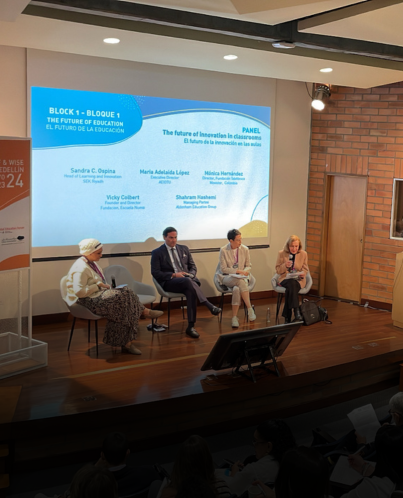Going Green – Is Your School Doing Enough To Teach Sustainability?
It’s clear that we’re already facing the consequences of climate change – from rising sea levels to extreme weather events. If we’re going to tackle it effectively, then schools have a vital role to play. By teaching environmental awareness in schools, we can help students make choices that will lead to a more sustainable future. Sustainability is more important than ever – but is your school doing enough?
Why teaching sustainability is so important
Last year, a survey by EdWeek gave a stark insight into how climate change was already beginning to affect schools. Out of 960 teachers, principals, and district leaders surveyed in the US, 25% said that climate change was impacting their school or district, while an additional 18% said that while they hadn’t yet been affected by climate change, they believed it was an imminent threat. 44% of those surveyed said that they’d either had to cancel lessons or close the school and switch to remote learning because of severe weather. The survey also revealed that most schools hadn’t taken any action over the past five years to prepare for climate change – mainly because of a perception that the effects of climate change won’t impact them.
Climate change is already having an effect on children’s education around the world. School buildings are being destroyed by extreme weather events like storms, floods, and cyclones – in 2019, Cyclone Idai destroyed 3,400 classrooms in Mozambique – or children’s schooling is being interrupted by droughts and heatwaves. As climate change worsens, we’ll likely see more extreme weather all over the world. Clearly, teaching sustainability is becoming more and more important. By teaching students about the causes of climate change and what they can do to combat it, we can encourage them to take action – both individually and collectively. This way we can help to make a difference now, before it’s too late, and change the planet for the better.
The benefits of teaching sustainability
By teaching your students about sustainability, you can help to set an example for future generations. Sustainability is a team effort, and everyone from teachers and students to the school leadership team and even parents needs to play a part. Focusing on sustainability, and teaching students about the importance of it, can help you and your school to become more eco-friendly and reduce your carbon footprint. In the future, making greener choices can benefit everyone, leading to a healthier population, more employment opportunities, and a more sustainable future.
There are more benefits to teaching sustainability, too – other than the overall benefit of protecting the environment. Schools and teachers that take the time to educate their students on the importance of sustainability encourages those students to become global citizens. Educating them on issues like climate change allows them to better understand their place in their world, and impress upon them values like empathy and open-mindedness. This way, you can look to the future and help set them up for life after they’ve graduated – something we believe is imperative at Aldenham Education Group, as we try to prepare our pupils for a fast-changing modern world.
How to incorporate it into your curriculum
Teaching sustainability involves more than just learning facts about the environment. If today’s students are going to be able to make some kind of change, they need a whole new sustainable mindset. This is where schools can make a difference, by impressing students with more environmentally-friendly behaviours and skills and encouraging them to fully engage with the fight against climate change. When teaching students about the harmful effects of climate change, it’s important that solutions are built into lesson plans. For example, in a lesson about the greenhouse gas emissions from cars, teachers should also mention ways of reducing traffic, such as cycling or taking public transport. Students won’t be left feeling anxious about the future if they learn ways to be more proactive and eco-friendly.
There’s no need for schools to completely overhaul their curriculums when teaching sustainability. It can be done in small ways, like using interactive digital whiteboards in classrooms – which we’ve installed in our latest school, Aldenham Prep Riyadh. Not only are these more engaging for pupils, but they can drastically reduce the amount of paper worksheets that are printed and thrown out each year. Schools can also set up eco-friendly schemes to motivate students to be more sustainable when not in the classroom – such as encouraging them to recycle more, or installing a school garden where students can care for plants and grow their own fruit and vegetables. Investing in renewable energy – by installing solar panels, for example – could help your school to be greener and to save money at the same time.
How schools could be more sustainable
It’s important for schools to take action both in and out of the classroom – to educate their students on being eco-friendly while reducing their environmental impact at the same time. At Aldenham Education Group, that’s exactly what we’ve started to do, throughout our network of international schools. Our students – at all of our schools – have many opportunities to learn about nature and how to care for it, whether it’s learning about animals in the Zoolab or simply appreciating the greenery that surrounds Aldenham UK. At Aldenham Prep, our students learn about and celebrate Earth Day each year. Throughout the rest of the school year, the students elect ‘Eco Warriors,’ who meet up once a week to discuss environmental issues.
In 2021, we opened a new building at Aldenham Prep, replacing a 1920s building that was no longer fit for purpose. The new building includes modern facilities and cutting-edge sustainable features, including natural ventilation and heat recovery units – designed to minimise energy consumption. In 2019, we also invested in an eco-friendly ‘Garbage Guzzler’ to reduce the amount of food wastage. Aldenham UK was the first school in the UK to use this technology, which uses bacteria to break down food, cardboard and paper packaging, and turn them into a product that can be used as either a soil improver or biomass fuel. Andy Williams, the Head of Aldenham Senior School, explained, “Reducing our wastage this way, on site, enables us to not only service our grounds more efficiently but also allows us to reduce vehicle movements that are associated with recycling.”
It’s important to get children to learn about the natural world and to connect with it – if we’re going to protect the environment for future generations, we need to start now. Even the smallest of steps could help to make a change and have a positive impact. At Aldenham, it’s important for us to strive for a better future – and help our students and the planet as much as we can. As well as providing them with an all-round education, we aim to give them the skills they need to change the world. Aldenham UK is surrounded by acres of leafy countryside, which helps to impress on our students how important the environment is – take a virtual tour of the site to see what we mean, and make sure to explore the rest of the website to find out more.


